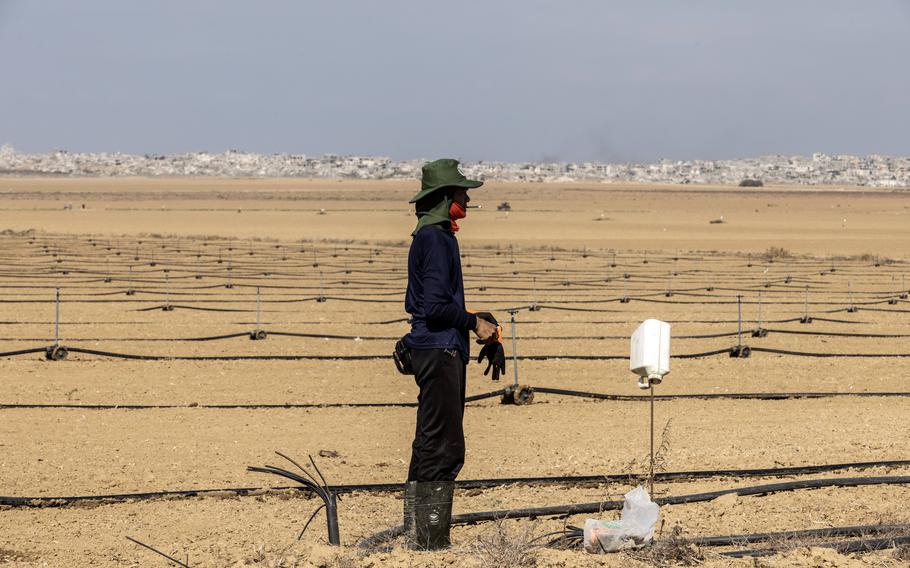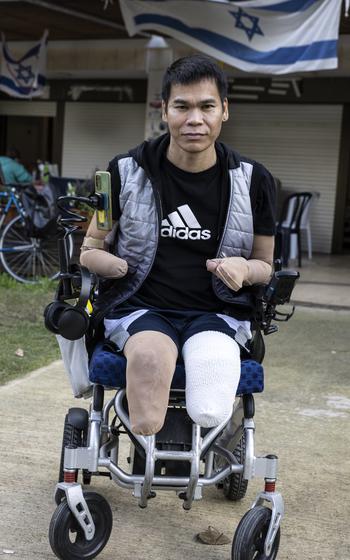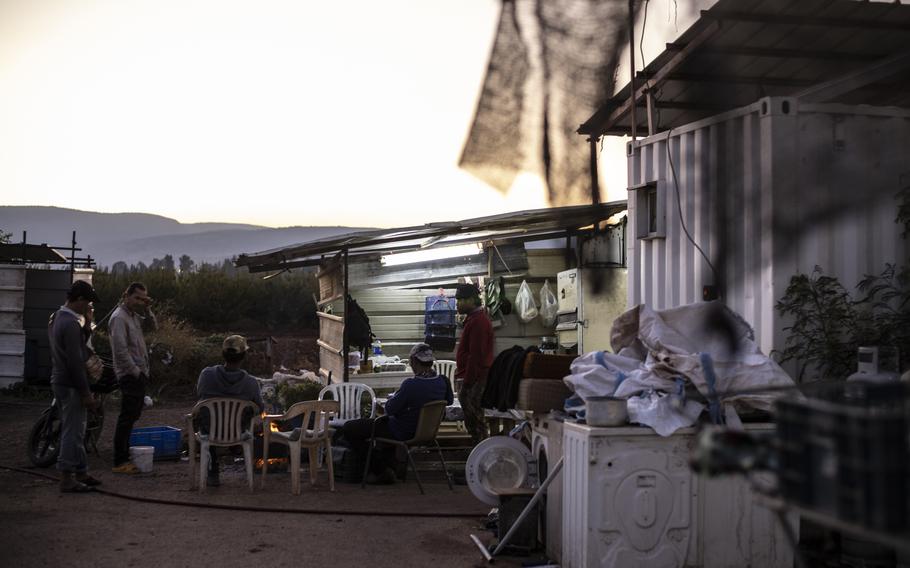
An agricultural worker from Thailand working on irrigation pipes in the fields near Kibbutz Nahal Oz, against the background of destruction in the Gaza Strip near the border between Israel and Gaza. (Heidi Levine/The Washington Post)
METULA, Israel — Israel’s northern border with Lebanon has been largely emptied of civilians for over a year. Even before the ceasefire between Israel and Hezbollah started to fray in recent days, Israeli officials had said it wasn’t safe for residents to return.
There is one group of civilians, however, who have been here throughout the war.
When Israel ordered more than 143,000 of its citizens to evacuate border regions more than a year ago, it allowed migrant farmworkers, mostly from Thailand, to stay put — to water crops, prune trees and harvest fruit as rockets fell around them. Thousands of Thai workers have been laboring in Israel’s frontiers for months, some inside closed military zones where they’re the only civilians present alongside Israeli soldiers, authorities say.
At least six migrant workers — five Thai, one Indian — have been killed in cross-border attacks in the north this year. Four Thai workers died of rocket fire in October after receiving Israeli military permission to work in the evacuated town of Metula, about 500 feet from the border, Thai authorities said.
“We have tried everything, everything possible to stop this,” Thailand’s ambassador to Israel, Pannabha Chandraramya, said in an interview in Tel Aviv.
Even before the Metula incident, Thai leaders had pleaded with Israeli officials dozens of times not to allow workers in high-risk zones, the ambassador said, and each time were given assurances by Israeli officials. The legality of sending foreign workers into military zones was vague, workers rights groups said, until October, when a Thai worker was killed. Then Israeli Interior Minister Moshe Arbel said it was illegal to employ them in areas that had been evacuated. In a private meeting the following month, Pannabha said, he promised again that Thai workers would not be sent to the front lines.
And yet, Pannabha said, she knows Thai citizens remain in the open fields of Israel’s embattled north and south, far from shelters and with virtually nothing to shield them from exploding shrapnel. As air attacks across the Israel-Lebanon border intensified in mid-November, Washington Post reporters saw trucks of Thai workers being waved into closed military zones at Israeli checkpoints.
“It’s unacceptable,” Pannabha said, her voice rising in exasperation. Thailand has already lost too much in this war, she added. Forty-one Thai nationals were killed by Hamas militants on Oct. 7, 2023, and six were taken hostage — the third most of any country, after Israel and the United States.
The Israel Farmers’ Federation, which represents private farmers in the country, did not respond to requests for comment. Israel’s Interior Ministry directed questions to the Population and Immigration Authority, which said responsibility for allowing workers to enter high-risk zones lies with the Israeli military.
In a statement, the military said, “Agriculture is a central component of the northern residents’ economy, and to balance various needs and allow for the preservation of agriculture as much as possible, requests from farmers for agricultural work in closed military zones are reviewed. Based on situational assessments, exceptions are made to permit agricultural work in restricted military areas.”
Israeli officials say Thai workers are not being forced to work in border regions or even to stay in Israel. But labor rights advocates say this is disingenuous.
“It’s not a free choice. Not really,” said Nir Dvortchin, an Israeli filmmaker who produced a documentary on Thai workers in Israel. Even if they want to change employers or work sites, most Thai laborers are too afraid to ask or aren’t able to because they speak little to no English, said Orit Ronen, manager of the agriculture workers department at Kav LaOved, an Israeli rights group.
A half dozen Thai workers interviewed by The Post said they earn four to ten times more in Israel than in Thailand’s impoverished northeast, where many of them are from. All said they have young children to raise, and some said they incurred debts to travel to Israel.
Employers don’t pay them if they choose on a given day not to work because of security concerns, the workers said. So on most days, they do. Videos from the workers show them plucking apples and kiwis with air-raid sirens blaring, ducking behind trees or under trucks as missiles streak overhead, and taking off through the fields on foot when panic set in.

Thai farmworker Bunnlod Chalsonngkram, 41, needed amputations after a tick bite caused a blood infection while working along the Israel-Gaza border in June 2023. (Heidi Levine/The Washington Post)
It’s not normal work, said Thitiwat Klangrit, 35, as he stood pruning a peach tree in Metula one recent afternoon. Dressed in a thin cotton shirt and a sun hat, he grimaced as rocket fire boomed nearby.
He had been getting used to the sounds of war, he said, but became more skittish a few weeks ago, after a group of four workers he knew went to work near the hill behind him. Thitiwat squinted into the sun, pointing at the direction of the borderline. His friends went past that hill, he said, and never came back.
Israel has come under mounting pressure to boost its domestic agriculture sector, especially after Turkey, which had been a major food exporter, severed all trade in May.
But much of Israel’s homegrown crops are in its northern and southern border regions, where labor is in short supply. Palestinian laborers have been barred from working in Israel since the war and many Israeli workers have been conscripted to fight.
Before the Oct. 7, attack, about 30,000 Thais worked on Israeli farms, the result of a decades-old recruitment effort by Israel to wean itself off a Palestinian workforce, say labor researchers. About 9,000 of them went home immediately following the attack. But Israeli farmers offered higher wages to those willing to return — and many accepted, coming in waves since the start of the year. As of November, there were 35,000 Thai workers in Israel, according to government figures.
Lior Bez, 51, a member of the IDF reservist unit guarding a checkpoint into Metula said there were “loads” of Thais working in and around the heavily bombarded town. “They have their own reasons for coming back,” Bez said. “It’s not like we can ask them to leave.”
Suraphut Theerawuth, 37, was working on irrigation systems along the Gaza border during the Hamas assault and said he survived by locking himself inside a bunker. He fled to Thailand but there were no jobs in his home province of Udon Thani that rivaled his pay in Israel of 10,000 shekels or about $2,700 a month, he said. So he returned to his old farm, “abandoned,” he said, except for Thais.
The sounds of Israeli bombardment on northern Gaza are near-constant. Grenades and occasionally rockets are still launched onto the Israeli side of the border. “Of course I’m scared,” Suraphut said, “but I have to work.” He shared photos of his 5-year-old daughter, a girl with bright eyes and dark, bushy brows.
Anuchat Khokham, 43, said he came back to Metula because his wife gave birth to twins eight months ago.
Pradoemchai Samart, 37, said he returned to the farmlands north of Haifa because he accrued debts in Thailand he now has to pay off. He thought it would be safer in the north than in the south. But there, too, the sounds of the missiles, jets and drones play in a loop, keeping him up at night, said Pradoemchai. “I didn’t know it was going to be like this,” he said.

Thai farmworkers at a makeshift camp in northern Israel in November. (Heidi Levine/The Washington Post)
When Thitiwat arrived to work in Metula in April, Prahyat Pilasrum had been there six months. The two shared a room, along with a third worker, at a hotel about 17 miles from the border, Thitiwat recounted. They cooked Thai food for each another on a gas stove they set up on their balcony and shared beers on Saturdays, their only days off.
In recent months, they’d talked more about the war. Prahyat was more optimistic than he was, said Thitiwat. Once it became less dangerous, his roommate told him, they would go fishing together.
On Thursday, Oct. 31, Thitiwat was at work on a peach grove when he saw an explosion that seemed nearer than usual. Soon after, he and other workers watched a helicopter descend onto the site of the blast. Thitiwat said he called Prahyat’s phone repeatedly but his roommate didn’t pick up. “I had no idea what to do. I had no idea how to feel,” remembered Thitiwat.
Prahyat was one of four Thai workers killed on Oct. 31. He was 42, a father of three and his family’s breadwinner.
The workers’ remains were collected and sent to Israel’s Ben Gurion Airport, where Pannabha led Thai and Israeli officials in a ceremony. Pannabha said repatriating the remains of Thai citizens, which she’s had to do multiple times in the last year, has been the toughest assignment of her career. “Every single time,” she said, “I pray it’s the last.”
After the incident, Thailand’s foreign minister sent Israel a letter of protest and called for all Thai nationals to evacuate the border regions. The Thai Embassy in Tel Aviv circulated pamphlets telling workers it’s not safe in the north. But ultimately, said Pannabha, Thailand doesn’t have authority in the country.
Thitiwat said he couldn’t bring himself to go to work the day after Prahyat was killed. He didn’t go on the second day either. On the third day, he called his wife, who was home in Thailand, taking care of their 2-year-old daughter.
And on the fourth day, Thitiwat said, he got up before sunrise, left the hotel room with Prahyat’s empty bed, and went back to work.
Wilawan Watcharasakwej in Bangkok contributed to this report.
Video: Southeast Asia bureau chief Rebecca Tan visited Israel in November to speak with Thai workers that are laboring in Israel’s high-risk military zones.(c) 2024 , The Washington Post